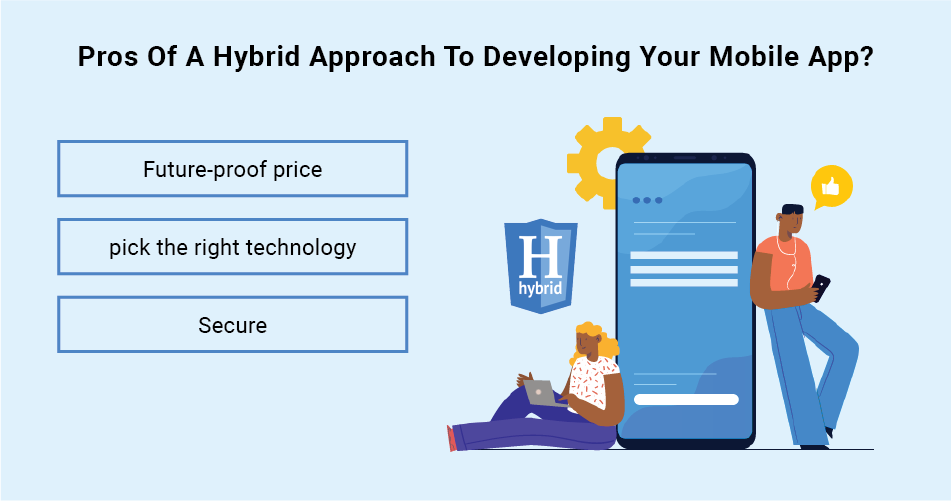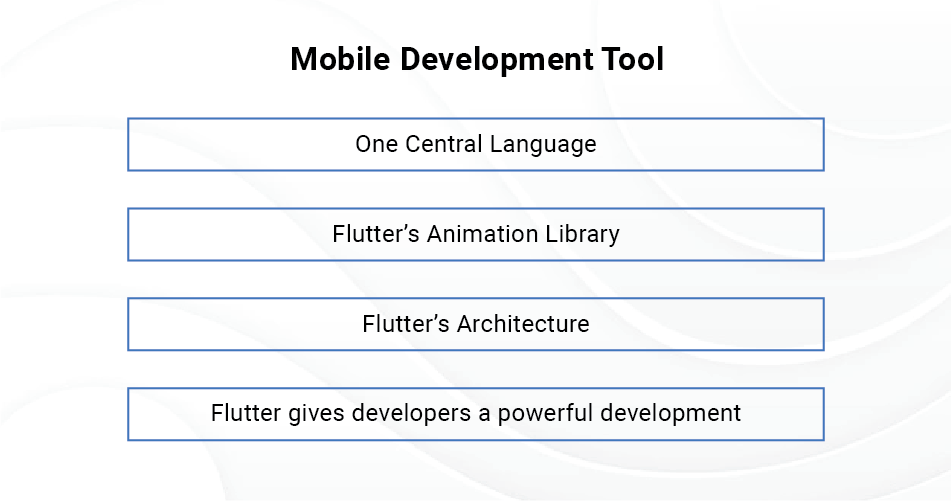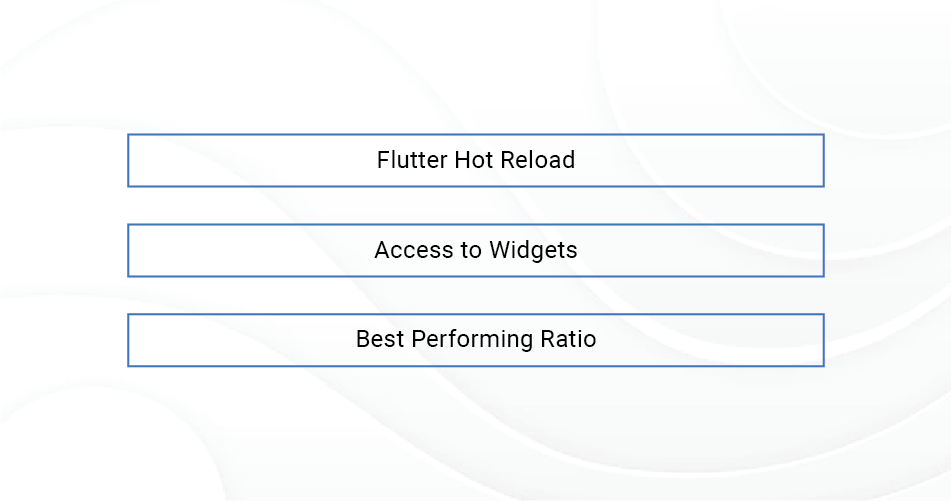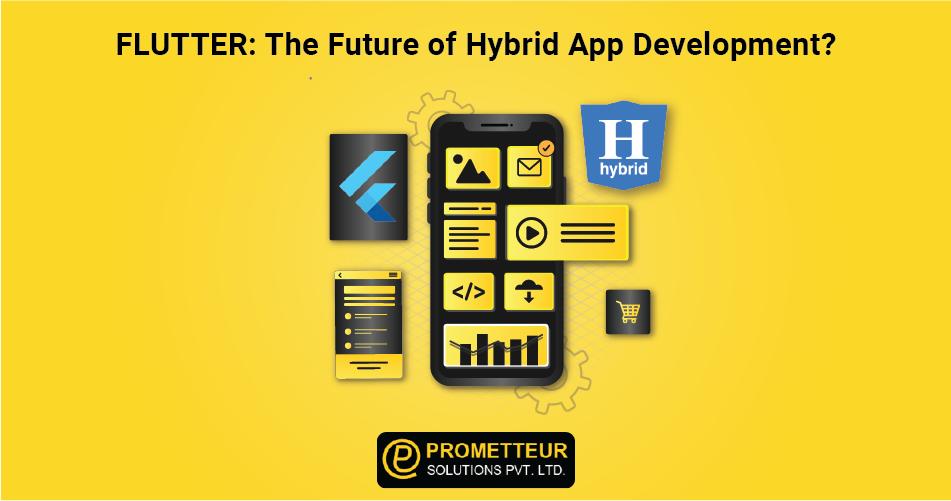If you want to create a mobile app right now, hybrid app development is the way to go. The hybrid approach to mobile app development is becoming increasingly popular, thanks in part to hybrid development technologies improving their capabilities. While native app development was once thought to be the be-all and end-all of mobile development approaches, this is no longer the case. Hybrid mobile app development has the same right to enter the ring and win its prize as any other technique.
However, you may be wondering what hybrid app development is. In contrast to native app development, it is the easier, but riskier, approach to getting things done if you want to make a mobile app. Stay tuned to find out if hybrid app development is right for your mobile app business strategy. You’ll discover why some of the most well-known tech businesses choose flutter for hybrid app development to native app development.
What is a hybrid app?
A hybrid app is a combination of a mobile app and a web app. This way, an app can be built for the web and a mobile app, but if developers need to test for a particular feature for the mobile app, they can test on the web. This way, app developers can get a feel for how the app will perform and how their apps are going to perform. For example, the testing of the analytics on a web app is easier to run than in an app.
This is because of the different languages between the web and mobile apps. But in the case of mobile app development, they are more similar than most people think. Using the tools that are available to them, mobile app developers can work with several mobile webs and mobile app features. They can build hybrid mobile apps.
Why Use A Hybrid Approach to Create Your Mobile App?
For starters, it’s generally a much faster way to bring your app to market. With a hybrid approach, you can use development teams that are familiar with both the hybrid and native mobile development processes, while still leveraging the proven mobile development practices that are native to the platform on which your app is built.
In addition, you’re able to add multiple devices at the same time. Hybrid apps take advantage of new mobile technologies, and as a result, are easier to create and market. Some top reasons to use a hybrid approach to mobile app development include,
The benefits of this approach are as follows:

- Hybrid apps take advantage of new mobile technologies, and as a result, are easier to create and market.
- Hybrid apps integrate with the native mobile platform on which they’re built.
- What Are the Pros Of A Hybrid Approach To Developing Your Mobile App?
- The speed at which these hybrid tools and technologies are evolving means that they have a near-future-proof price. The hybrid app development cost is typically a fraction of that of other mobile app development platforms.
- Hybrid app development does not lock you into one technology – you can pick and choose, picking the right technology for the job. This also means you are unlikely to be locked in to a specific platform.
- Hybrid App Development Is the Most Secure Option. Hybrid development technologies allow you to incorporate coding features that aren’t supported by all platforms, which can offer better security.
What Are the Additional Challenges When Developing A Hybrid App?
Formal and iterative methodology
It’s easier to go slow and iterate when you work with something you’ve already designed and have the resources to do so. It’s easier to go slow and iterate when you work with something you’ve already designed and have the resources to do so.
Developing UX and cross-functional teams
With hybrid development, you have both UX and developer resources available at the same time. It’s easier to develop apps that are just right. With hybrid development, you have both UX and developer resources available at the same time. It’s easier to develop apps that are just right. Evolving technology and UI trends. Hybrid apps are more likely to evolve and adapt to new technologies and user needs.
Flutter for The Future of Hybrid App Development
Flutter is a new mobile app SDK that makes it easy and fast to build beautiful mobile apps. Flutter works with existing code, is used by developers and organizations around the world, and is free and open source. This section will help you learn Flutter, the new technology behind hybrid app development.
Flutter’s codebase is written in Dart, which was created by Google in 2011 for building web applications. Dart compiles native machine code for both iOS and Android. This means you get the same performance as you would from a native development using Objective-C or Java – but with much less work!

Flutter, like Dart, is the latest in a long line of open-source, cross-platform mobile development technologies. It has a modern, user-friendly, prototypal design and the best productivity of any mobile development tool currently available.
One Central Language
Flutter also includes support for Dart, which, as a programming language, enables new features to be added quickly without sacrificing stability and performance. That’s important when hybrid app development involves both iOS and Android.
The Flutter platform uses the Dart programming language as its primary language. As a result, regardless of the app or OS platform, developers can only create code in one language. Flutter can operate magnificently across iOS and Android devices because of its common language. Furthermore, when working with Flutter, developers have fewer challenges and do not need to modify their code approaches.
Flutter takes hybrid mobile app development to a new level by allowing users to be bilingual. Because consumers may utilize the mobile app in their favorite language, your app will have an advantage over its competitors. Furthermore, because the platform is simple and accurate, the mobile app runs at the same pace across the board. Along with the speed, the app’s performance is never jeopardized.
Developers will find it simpler to integrate into the app development framework with the availability of the Dart programming language. As a result, when compared to its competitors, Flutter app development outperforms them.
Essentially, the process of mobile app development can be accelerated since developers “feel at home” when working with Flutter. We are all aware of the importance of time in today’s business world. Businesses that take advantage of the early-bird advantage have a significant edge over their competitors.
Flutter’s Animation Library
The libraries available for Flutter app development are extensive. One of the main reasons why developers prefer the framework over alternative SDKs for developing cross-platform apps is because of this. Developers can create better UI/UX for mobile apps because of its huge library.
Because hybrid applications run on a variety of mobile OS systems, they require a huge number of animations tailored to each platform. Flutter hybrid provides developers with access to a large library. As a result, clients have the freedom and flexibility to pick what works best for the hybrid mobile app.
Flutter’s Architecture
Flutter’s architecture is based on the Dart programming language. This language makes use of the Skia C++ engine, which is open-source and enables high-end graphics. Furthermore, unlike React Native, Flutter’s architecture does not necessitate the use of a JavaScript bridge. Because without it, the framework can connect with native components.
Various frameworks, such as Cupertino and Material Design, are also included in the Flutter hybrid architecture. As a result, developers don’t need to hunt for any third-party add-ons because everything they need is already included in Flutter. This has a significant impact on improving performance.
Flutter gives developers a powerful development
platform and as a result, more flexibility. This allows developers to develop both native mobile apps and hybrid apps with Flutter.
Aside from using Flutter for developing and creating native apps using native development tools, you can use Flutter to convert native iOS apps to create hybrid apps. You can use native Flutter libraries to convert apps for Android and many more platforms.

Flutter Hot Reload
This is one of the most appealing aspects of Flutter application development. Developers can view changes to the code in real-time thanks to the hot reload functionality. Because the modifications are seen immediately, the developers can correct their errors (if any). Furthermore, making required modifications throughout the creation of a mobile app becomes easy.
Developers grade Flutter so highly among its rivals because of this functionality, among many others. Also, with hot reload, the developer does not have to execute the program every time the changes are made. While making the required modifications, they may see the ultimate product. Bug fixing is also made easier and more dependable with hot reload.
Access to Widgets
The hybrid mobile apps created with Flutter are extremely customer-focused. Because it gives customers the option of selecting from a variety of widgets when using the mobile app. Because a wide range of widgets is easily available, users may get on with their job without delay.
The widgets are arranged exactly so that users will have no trouble locating and utilizing them. The widgets not only enhance the hybrid app’s appearance but also make it extremely scalable for users. Developers may also place widgets in a seamless manner using Flutter app development.
The app’s large range of extremely decorative widgets enhances its visual appeal and distinguishes it from the competition. Therefore, the app’s large range of extremely decorative widgets enhances its visual appeal and distinguishes it from the competition. As a result, as the software gets more unique, the odds of it becoming a hit in the app store increase.
Best Performing Ratio
Flutter-based hybrid mobile apps offer a very high-performance ratio. This indicates that, when compared to other SDKs, Flutter app development is quite high in the rankings. The framework enables developers to create action-packed and feature-rich mobile applications in a short amount of time. Hybrid applications are not only quick, but they are also dependable and provide a native app-like user experience.
Because the framework is backed by Google, it has a sizable development community. As a result, developers working on a specific project may obtain help whenever they need it. Furthermore, the cross-platform app development framework is optimized for 60 frames per second.
Final Words
Every developer needs to be able to confidently handle every level of hybrid development. Flutter’s highly reactive architecture makes hybrid mobile app development easy. As a result, the interface may be readily modified by just altering the variables. When changes are made to the state, the user interface will automatically reflect them. Your hybrid app will be able to ‘seize the moment’ in the market thanks to Flutter app development.
The goal of cross-platform app development is achieved since it performs incredibly well on both Android and iOS. Aside from the aforementioned features, the framework also enables easy widget customization. As a result, firms may make better use of their resources and save a lot of money.
